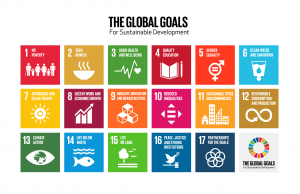This minor program is open to all students, but we explicitly recommend it to Social Work, Health Care, Pedagogy, Education & Teaching, Law, Security Studies, Human Resource Management and Economics students. We gladly welcome incoming international exchange students!
Admission
To enter this program, you are expected to have good oral and written English language skills.
You can also follow this minor as a part-time student if you have a job or do an internship that has a connection to the Sustainable Development Goals. Ask the minor contact person for the possibilities.
The Examination Board determines which minors do not have a higher professional education level and/or have an unacceptable overlap with the compulsory curriculum of your own study programme. Check at the page Not allowed minor courses under your institute which minors are not allowed.
Content
The minor International Development Work (IDW) focuses on international development issues in a globalizing world. It will give you a solid foundation in international development work theory, and provide you with the opportunity for (extended) field practice. You’ll attend lectures from Dutch and international experts. You work alone and in small groups of fellow highly-motivated (international) students.
International aid workers and related professionals increasingly have to address social problems that are being precipitated by international world-wide forces and events. The program will give you the opportunity to expand your repertoire and competencies by learning about theories, approaches, methods and actors in development and development work. The course content is founded in the relation between development and social work and covers topics as community development, social entrepreneurship and climate and ecological justice.
A week long excursion to Sarajevo and Srebrenica in Bosnia is included in the course program. You will participate in a Sustainable City Challenge applying the method of design thinking. And you will also work on a field project for a non-profit organization. For students who want to spend more time in “the field” we also offer an exciting opportunity: during the second part of the semester, you either continue with the program in the Netherlands or you can opt for our practical program and work on an extensive field project abroad. The option to go abroad is only open to our Dutch students due to contract obligations with our international partner universities.
Learning objectives
Objectives for the courses are formulated in an extensive brochure on the minor’s program. Please send an email to minorIDW@hu.nl if you would like to receive the brochure.
Courses
The program takes place during one semester (September-January) and contains the following topics: international development theories and history, social entrepreneurship, climate change and ecological justice, community development and a practical fieldwork project.
Assessment
Assessment takes place through various assignments (written exam, group presentation, individual reflection) in which your knowledge, understanding and critical reflection of social development theories and practical experience are tested.
Literature
As we like to keep our literature updated, we announce the exact titles of books, articles, and documentaries we use in spring 2025, so we can include forthcoming publications.
Schedule
Classes are scheduled for 2 or 3 days a week (to be announced).
With the exception of the first teaching period of the academic year (starting September), the lesson and test schedules are always posted on Mijn Rooster four weeks before the start of each teaching period. The schedule for the first teaching period of the academic year can be found on the site three weeks before the start. The most up-to-date schedule is always visible on Mijn Rooster.
At HU, full-time education may be scheduled between 08:30 and 19:00.
Additional costs
Excursions: Transportation Utrecht-Bosnia v.v. and approx. 7 nights stay in Bosnia.
Transportation and stay for international field work (optional).

This minor course is marked by the Green Office as a sustainable minor. This means that by participating in this minor course, you can contribute to one or more of the Sustainable Development Goals from the UN.
Reviews
“I really enjoyed this minor. The classes were super dynamic, we had a lot of debates and our group was very nice. I was used to sit in a class and listen to a teacher, but this minor was much more active. I chose this minor because I wanted to have the experience of studying abroad, get to know the ways of learning in another country and to meet new people. I learned a lot that I would never have learned at home, for example about climate action, the history of colonialism and poverty. We don’t really touch this sort of subjects at my university.
To students who consider to choose this minor I would like to say: don’t be afraid to take this step, because the teachers are very helpful from the first day, for example if you have problems with the language. And also: don’t be afraid to give your opinion.”
Jordi, student Social Education, Universitat Ramon Llull, Barcelona, age 20